Schiller Institute Conference September 15-16, 2007 Kiedrich, Germany Beyond the Eurasian Landbridge: The Cultural Paradigm of the Millennium To Come Jacques Cheminade |
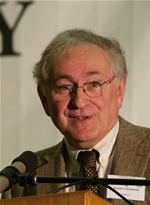 EIRNS/Julien Lemaître |
Mr. Cheminade is the head of the LaRouche movement in France. He has twice campaigned for the French Presidency. The full title of his speech to the Schiller Institute's Kiedrich conference on September 16 was "Beyond The Eurasian Land-Bridge: The Cultural Paradigm of the Millennium To Come." It has been translated from French, and subheads have been added.
First I want to say something to Amelia: I have a dream. A dream which is not a dream, because of all of you here in this room and many others to come after you. Such a shared dream becomes a political project, a mission to change society for the better of future generations. That is what came to my mind in the early hours of last night, while I was preparing this presentation.
What we have been discussing these past two days, as a unity of diversities, is the proof that the ideal, ideas, is what transforms the real—it is the mind of the real. Hence, politics is not a mere power game, a Roman arena for shows of strength, but a yearning, a desire for justice, a fight through which the most intimate part of ourselves is committed to the social good. This means that to be truthful, to be fit for our public task, we have to educate our emotions, change the way we think, change the way our thinking springs forth to accomplish what we know is the right thing. The cultural paradigm for the millennium to come, a new Age of Reason, demands that we take up this challenge.
Lyndon LaRouche, in an August 29, 2007 paper, "How Space Is Organized", conveys that with the following words:
"Therefore, I must warn you, that if you were to think you have reached the occasion to assume the leadership of a nation in crisis, the crucial test is not what you merely say, or even think about this or that subject; the issue, then, is simply, how you think about almost everything. Whatever you are, you must be that, universally.....
"Wise citizens would select important leaders not for what they say in bite-sized drops, but for the way in which the discernable map of their mind would lead those candidates under the conditions of their future personal crisis-situations.....
"In contrast to the behavior of lower forms of life, ideas of universal physical or artistic principle, as distinct from just any old, or new ideas so called, are the most important, and actually the only really determining factors in the shaping of human history."
Oligarchical Control of the Mind
Heavy words. Now, for a better understanding of what they mean, let's look first, even if briefly, at the mental cage in which our society puts us, the process of downbreeding we are subjected to. To an economy based on self-cannibalism and the issuance of fictitious capital—based on the absolute rule of short-term gains—corresponds a culture of death, based on mortality, the cult of the present against the fate of future generations, as if human life were a chip in a globalized casino.
It is the system of Paolo Sarpi, Galileo, Francis Bacon, and Descartes, the system of a feudal landed oligarchy born again in the form of a merchant, financier oligarchy. Its acts, its very way of proceeding, is the dismantling of human life. For that purpose, it divides the human itself into two parts, generating an entity in which emotions are cut off from cognitive action, quite aptly described by the Austro-Hungarian Robert Musil as a "man without qualities."
On the one hand, you have a mechanistic universe, that of formal understanding, with forms and figures provided by the senses and organized mechanically, the rigor mortis of mathematical logic. On the other, you have the sensitive, excluded from reason and given over to what Pascal called the madwoman of the house—la folle du logis—or, if you prefer a masculine image, to a Lord whose fantasies are coming out of his unzipped fly.
This divided self is unable to know, because knowledge can only exist as an ascent, a rising from the sensitive to the intelligible, the cognitive, and this is precisely what the oligarchical system willfully breaks. Schiller, in his Aesthetic Letters, during the years of the French Revolution, had already identified the two sides of such a divided self as the "barbarian," who acts according to a dogma, pure form, and tries to eliminate the other physically or through a flood of sophisms; and the "savage," left to his instincts, pure unleashed emotion, rage, and desire.
This present form of oligarchical control or enslavement of the mind manipulates the sensitive to degrade it into the sensuous, then into the sexual and finally into a cult of death: Eros leading to Thanatos, the very program of the Congress for Cultural Freedom, the operation of the Anglo-American services denounced by Frances Stonor Saunders, and fully exposed by us. How does it work? Man is reduced to an animal—a well-trained animal for the higher classes, a low-bred animal for the lower classes—through the destruction of his intimate self, and then he cannot change the system in which he is trapped, because he has lost the very source of knowledge, and can no longer discover the laws of the universe in order to change the universe. There is no more horizon, no more way out of the cage, because he is embedded in the system by manipulation of his senses, just like a journalist embedded with the U.S. Army in the Iraq War becomes unable to understand in what sort of game he is trapped, because his environment is controlled.
Cultural pessimism takes over, and this wrecked man becomes a killer sitting in a Humvee, or a video-game addict set up to "Counter-Strike," trained for random killing. Even if the immense majority do not commit suicide or kill others, the counterculture has killed something crucial in you: your human emotions, the principle of immortality.
From the French Revolution to MySpace
Look, historically, at how the French Revolution miscarried, through the taste of blood at the fall of the Bastille. A society, deprived of transcendence by the French and British Enlightenments and reduced to arrangements of sensuous feelings, produced a man with uncontrolled emotions, be they savage or barbarian or both, as Schiller identified him, who falls prey to a cult of death, which Napoleon would later extend to a murderous imperial policy of self-destruction.
Look, then, at our people today; look at our counterculture, which eradicates the very basis for the human mind to develop, as the principle of hearing and the principle of musical composition are destroyed by orgies of noise. What is promoted is an acting out of bestial appetites, a self so selfish that it escapes from reality into a virtual world, with virtual bodies, the so-called "avatars" of Second Life or the "friends" of the more community-oriented website Facebook, or Rupert Murdoch's MySpace, or the British Bebo, or Asmallworld, or Friendster, or LinkedIn, or Mash from Yahoo, or Netvibes. There you are "entertained" in the anxious quest for "friends," friends associated with your pleasure to seduce, with the virtual marketing of your selfish ego. Find the right community of people to belong to, give your name, address, picture, and date of birth; tell us your political views, your religious affiliations, diplomas, jobs; tell us about your relationship status: Single? In a relationship? Engaged? Married? Or "It's complicated"? It does not matter: Friends, friends, friends are awaiting you everywhere.
Then your little narcissistic self controls you from below, while all information about your private life is gathered by the network, like a vacuum cleaner of your "tastes." And you are finished as a human being; you are something in the network, cannon fodder for the system. You are an other-oriented pawn inside a virtual lonely crowd, well beyond what David Riesman warned against in the middle of the 20th Century.
Don't say you are too smart—or too old—to fall into that trap. Check your mind first. And remember the story of the French frog. If you put it into hot water suddenly, it jumps out, but if you first put it in cold water, then in lukewarm water, then you make it warmer and warmer, it feels more and more comfortable—a warm comfort zone, you might say, some like it hot—until it is too late. You have lost all sense of temperature; you are cooked.
Remember what Josef Goebbels used to produce as propaganda: some pro-Nazi movies, right, but mainly entertainment movies to stuff the citizens with entertainment, he said, to disorient them from reality. Now look at today's Hollywood "entertainment" movies, and compare them to Goebbels', putting aside for a moment the historical context. The ones by Goebbels look like fairy tales compared to the Hollywood gory horror shows. This indicates what is in store for us, if we don't change the cultural paradigm.
Therefore, we are not dealing with a debate on the basis of ideas, fair or unfair, but with the destruction of the basis on which a human being can debate ideas. The issuance of fictitious monetary claims is complemented by a fictitious human being, unable to understand a systemic crisis, because he has been ground into the system through his greed and fear; he has become a virtual instrument of it.
Culture and the Eurasian Land-Bridge
Now we have reached what is at stake with the Eurasian Land-Bridge: to free the human mind from enslavement and destruction, through joining in a project to change society, a mission-oriented project. The Eurasian Land-Bridge cannot be reduced to a thing in itself, some mechanical scheme to be added to the present way of thinking. It cannot be included, embedded, within the present way of thinking, because by defining a better horizon for the future, by having as its purpose the common good of future generations, it is a weapon to destroy the counterculture that I have just depicted. It is the most efficient weapon to destroy the present way of thinking, because it reopens the gates to a new culture of hope for the population, cultural optimism against the now prevailing culture of death.

The World Land Bridge. Existing routes are green (but these need upgrading to maglev), proposed routes are red, and proposed bridges and tunnels are circled.
As for space and time, I would like to show you two challenging perspectives of the Land-Bridge, to give you a sense that it is not a fixed object but an agent of transformation. First a picture showing it—space—on our planet from the South. Secondly, I would make an appeal for the production of holographic maps, based upon the time needed to go from one point to another, and not the distance. It will show how physical space-time is relative, and how the Land-Bridge is going to bind together, for mutual development, all the components of humanity. I would like to call it the Fermat Project of Least Time, a physical mapping of the Earth which expresses the change in the mapping of our mind. Better, we should conceive a three-dimensional map with both distances and time, corresponding in nature with the three-dimensional isotopic version of the Mendeleyev Periodic Table needed for our future technological strategy. We have thus the composition of a universe beyond flatness, Riemannian in the becoming.
Imagine now in social terms—this lies just before us—an anti-Euclidean, anti-flat universe of cooperative labor, where working for the advantage of the other becomes the natural thing to do. This is the paradigmatic change for the millennium to come, a world in which the sovereignty of the individual human being meets the sovereignty of the sovereign nation-state for the benefit of future generations. This is the universe of the Eurasian Land-Bridge: mutual development within a community of principle, a culture good for producing young adults who provide leadership.
Let's imagine—through our mind's eye—a world in which scientists, researchers, engineers, skilled workers from all nations work around a science-driver, study and experiment with the technological benefits of a flow of discoveries, and travel from one country to another to share the benefits of their work. The Baby Boomer's swinish attachment to petty issues has evaporated; the selfish attention to one's inner needs has been replaced by the eyes of the future, long-term thinking on mutual development. Then, it could be understood that progress of one is not achieved at the expense of the other—as most people believe in today's liberal jungle—but that "progress" is a common goal of humanity. You are freed from your selfishness, you feel better. Aha! What a relief! What a relief! You are freed from your self-subjugation.
What have you done? You have created a social structure appropriate to sovereign creative action, where the creation is not built in the structure, but the structure is like a runway for taking off towards new discoveries, beyond and further.
That is why the Eurasian Land-Bridge is not a thing in itself, a subject of technical discussion on its particular merits—it has merits to be discussed as such, but that is not the crucial point; it is a lever to change society. Beyond being a science-driver and a war-avoidance policy, it is a way for man to define on Earth the conditions to explore space and time, to "jump" from an Earthly identity to a Solar identity.
A Culture of Discovery
That is the culture of the millennium to come. Now, for something crucial about Kepler, speaking about a Solar identity. Kepler discovered universal gravitation, but not "as such." What he discovered was essentially the founding principle on which all competent mathematical physics was subsequently developed. The principle at issue was the discovery, not of gravitation per se, but of the underlying principle of all competent, modern, comprehensive mathematical physics.
In that sense, we can say that our Eurasian Land-Bridge is—at last—the manifest destiny of a Keplerian universe, the "structure" for which Kepler opened the door and began the process, continued now by LaRouche and those he has inspired. It is a change in the map of our minds, out of the mental cage of the last centuries, a change in how we think about almost everything, and how we sing about it.
We are hopefully entering into a culture of discovery, provided we fight for it, a new world of true human relations, against the brave new world of Huxley and all the hit men of the Venetian-Anglo-Dutch destroyers of humanity, against their culture of death.
Let's look at it a step further, as LaRouche has challenged us to do. What is this truthful universe of true human relations? How can you discern, discover the universal physical principles that define the culture of the millennium to come? What is the human structure of the Eurasian Land-Bridge based upon?
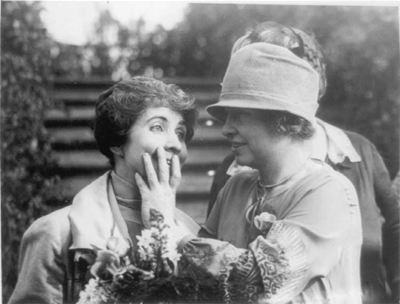
Not on evidence of the senses, the "problem" of the British and French 18th-Century Enlightenment, not the sense evidence organized through formal logics—induction and deduction. The human mind does not know truth through the eye or/and the ear, but through the paradoxical experience of comprehending a phenomenon by comparing the perspective of vision and the harmonics in hearing. This is what Lazare Carnot, as a follower of Leibniz, once called the physical geometry of the eye and the physical geometry of the ear, and that is one reason that both Leonardo and the school of Bach and Mozart through Francoeur, were taught as a "one" in the scientific school of Polytechnique. That's the culture we are in the process of giving birth to once again: the ironical juxtaposition of two seemingly contradictory senses to compel the mind to establish beyond harmony, with the harmoniously ordered universe of Kepler's Solar System, of Mendeleyev's Table, and the organization of the isotopic system for the industrial strategy to come.
That is the culture of our Land-Bridge, the communication of truth, of thought-objects, from one human being to another beyond the perception of our senses, through the reestablished capacity to ascend from contradictory sense-perceptions, after having cleaned up our mess, to the intelligible, to the eidos, to the idea.
Not through a set of fixed rules of the game, a mortal universe, as if the Creator had made Himself impotent in creating a universe of fixed characteristics, and reduced us to logical machines at work, or plants growing in a universe external to us. Do you think I'm kidding? Is it too much? Well, this is the universe of man-as-a-machine or man-as-a-plant (l'Homme machine et l'Homme plante) proposed by the insane but coherent La Mettrie in the 18th Century, a universe implicit in all reductionism, a useful caricature of what we would actually become without the Eurasian Land-Bridge concept.
The universe is within our minds, science and art, in our thrust to discover and improve, where the search for the best of ourselves meets the quest for the best of the other—that moment of human discovery where compassion for the other, the yet-unseen other of future generations, meets the discovery or reenacting of a universal physical principle, the very substance of a true human relation.
The mental language comes into harmony with the universe and the other, in a sort of in-betweenness, in the motion of the ascent towards the intelligible.
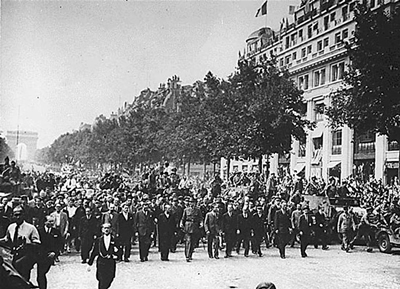
Let's evoke two things, ironically similar: the mental universe of Helen Keller, who lacked a functional sense of sight or hearing; and a moment in a theater when the lights are off, or a moment when we gaze into a dark sky, with no stars. It is the experience of the loss or non-existence of sensible landmarks, the deeply unsettling experience of something that you can neither see nor hear, except in the mind, purely in the human mind. It is the challenge to respond to the existential question, who am I? I don't know who I am for you, by a concept beyond what you can see or hear, the most intimate situation where the choice is either agony or mental power to create in the image of the Creator, doing something never done before, as Shakespeare would say, something "for the first time," beyond known landmarks. This is the culture of the Eurasian Land-Bridge, of space exploration, and of true human cognitive relations, our culture to come.
Alas, some would say, how far we are from that! It is utopian! It is so beautiful that it could never come true, could never be achieved!
Then think about de Gaulle entering Paris the day it is liberated, and becoming a poet at that moment; think about Roosevelt launching the Tennessee Valley Authority, or denouncing the "monarchists of the economy" in his first inaugural speech; think like Kepler and Bach, as our youth are having fun trying to do in some basement in the United States and some catacombs elsewhere. Tell all those professional, professionally anal, doubters, conscious or unconscious Cartesians, that their physical body would not be among us if their ancestors had "thought" like them. No way. Ffsst! Evaporated.
So we have to lead the only fight that's worth it, worth our human future, to pull humanity out of a New Dark Age, as LaRouche put it yesterday.
Leadership and the Sublime
Now, to keep the best for the end, as they say, I reach the dimension of the Sublime, Schiller's Sublime. Our culture, the culture of the millennium to come, would not exist without the Sublime.
When you are faced, like today, with a terrible challenge, the terrifying offensive to destroy humanity, with a most immoral social challenge; when the very principle of human society is scoffed at; when most others turn a blind eye to what happens, there is something in you that makes you stand up, even if you don't always know exactly why. Evil then calls forth higher reason, and strength of soul, a call to a response. We suffer from the violence of our sensations, the violence of our feelings, but yet we refuse to be enslaved by that violence. This is, beyond the aesthetic sense of beauty, the Sublime—the moment when human reason is beyond our sensitivity, like the thinking of Helen Keller or ourselves before a dark sky.
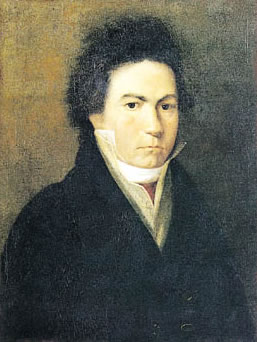

Percy Bysshe Shelley

Friedrich Schiller
Once, I was caught in the middle of a hurricane, and physically, I had to do something unprecedented about my situation. Mentally, it is the same type of challenge when you have to create: You ask, in the very depth of your being, "Why should I fight? What is the purpose of my life?" And then you think of what you can contribute to the future of your fellow human beings, and you fight, not with the animal instinct to survive, but with the human passion to become a better person for the other, to taste your cup of immortality beyond a situation where your body is threatened or your mind challenged, or both.
You experience what both Schiller and Shelley understood as the highest form of human joy, even if it can only be reached, and must be reached, through deep suffering.
Beethoven had, to my knowledge, the best sense of it, together with Shelley and Schiller, when he wrote on July 27, 1822, "What an unhappy happy man I am."
The Sublime is therefore what we must muster within ourselves to lead our fight today. But in the upcoming challenges of the next millennium, it should also become like a sixth sense in us, above the others, because it is necessarily associated with the very process of discovery. I must add that we are not going to run short of challenges in the future. We are still in the childhood of humanity, and the main challenges are ahead of us.
Let us therefore, with our Land-Bridge, open the gates to a society of beauty and the Sublime, and let us now think a moment about Beethoven. He was a staunch republican, and had to be locked up in the Vienna of the Carlsbad Decrees and Metternichean rule. He became deaf, when music was his life. He could not find a woman to share the most profound and impassioned conceptions respecting man and nature, because those that could understand him and cooperate with his work were aristocrats, beyond reach for a marriage or a lasting relation, like Josefine von Brunswick.
Nonetheless, Beethoven relentlessly fought "to break destiny's neck," to give birth to a world in which human beings would be "able to devote their efforts to other things than breaking their chains." He knew that during his lifetime, he was doomed not to see his victory over destiny, but that as a mortal human being, he could give to us, his posterity, through his compositions, the principle of immortality, and he won that struggle against all doom.
Now, think of a world where Beethoven and Amelia Boynton Robinson are the reference points for human beings, where all our friends of the past—Plato, Leibniz, Riemann, Schiller, Rabelais, Kepler, Beethoven—are going to be with us, in our minds. Think of Leonora [from Beethoven's opera Fidelio], who put her life at stake for her husband, and through him, for the future of humanity. Think of a world where our ideas, the ideas of Lyndon LaRouche and Helga Zepp-LaRouche and all those before them, and at their side, today, will be references, not extreme exceptions. Think of the triumphant dance of the last movement of the Eroica, after the funeral march.
Agape is the cultural paradigm of the millennium to come. "What an unhappy happy man I am." This unhappy happy man always stressed "the eternal need to start again and again what seemed to be achieved."
I see him writing, under the first notes of the finale of his last quartet, the 16th, Opus 135, the famous words: "Muss es sein? Es muss sein!" ["Must it be? It must be!"]
It may be a "schwergefasster Entschluss," a resolution difficult to make, but it is our commitment: "Es muss sein!"
The game is worth the candle, as they say in France. And this time, I won't say thank you, but thanks to ourselves, to our future deeds, on the route of endless discovery. Es muss sein!
_______________________________________________________________________________
Thomas Sankara on Africa's Debt Burden
After his presentation, Cheminade showed a video of a speech by Thomas Sankara, the former President of Burkina Faso, comparing it to the 1982 speech by then-Mexican President José López Portillo to the United Nations, which was shown the previous day (see EIR, September 7, 2007 for excerpts). Sankara gave the speech on July 29, 1987, before the Organization of African Unity. Cheminade then commented as follows:
Well, you have listened to what Thomas Sankara had to say: "If Burkina Faso stands alone in its refusal to pay the debt, I am not going to be here at the next Conference."
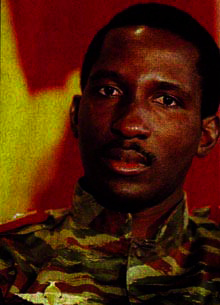
Burkina Faso stood alone, and Thomas Sankara, after a decisive confrontation with French President François Mitterrand, was murdered on October 15, 1987, less than three months after his speech. And, as he had said, he was not present at the next Organization of African Unity conference.
I must add two things:
1. If you notice similarities in the Sankara speech and the López Portillo speech, you are right on the mark. López Portillo was very close to Lyndon LaRouche and Helga Zepp-LaRouche, while Thomas Sankara was kept informed of our fight through a friend of mine, now deceased. Now, today, we have collected two signatures of French deputies and more than 20 signatures of French mayors, supporting Helga Zepp-LaRouche's proposal for a New Bretton Woods. Michel Rocard, a former Socialist French prime minister, is also calling for a New Bretton Woods, in his own way, and he was a close political friend of my past friend. So, we are reintroducing some motion in France on the pathway opened by LaRouche, López Portillo, and Sankara.
2. Sankara—a name coming, by the way, from an Indian wise man from the Eighth Century, a famous scholar of the Vedantas—was then alone, or almost alone, in his fight for a new, more just world economic order. He did not have a very good overall sense of world dynamics, and was somehow blinded by a cultural bias for African self-sufficiency. Today, the world is obviously a One, and we are not alone in our fight, so we don't have any excuse to fail. Proof is the coming report on the work of the LaRouche Youth Movement, our future.
Related pages:
More Speeches from the Schiller Institute Conference
Speech by Amelia Boynton Robinson
Amelia Robinson Takes Denmark by Storm (EIR)
F.D.R. and Jean Monnet: The Battle Against British Imperial Methods Can Be Won
Jean-Sylvain Bailly: The French Revolution's Benjamin Franklin
Helga LaRouche Addresses French LYM on Friedrich Schiller
What Does It Mean To Be Rabelaisian?
How Bertrand Russell Became An Evil Man
LaRouche Youth Movement (LYM ) Scientific Work
Percy Bysshe Shelley and the Motivführung Principle in English Poetry
English Translations of the Works of Schiller and Others
The 'History Plays:' Use Shakespeare to Fight the Jacobin Mobs
Poetry Seminar: The Principle of the Unity of Science and Art
Beethoven and Schiller on Stage
Leibniz From Riemann’s Standpoint by Lyndon H. LaRouche, Jr.
The Legacy Of Mendeleyev And Vernadsky: The Spirit Of Russia's Science

